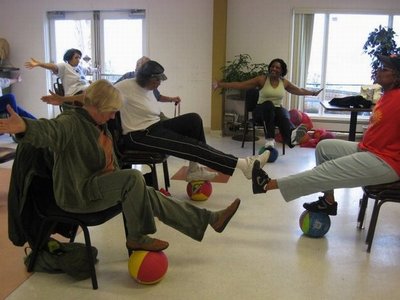May 7, 2009
Taking research from the ivory tower to the exercise mat
“I was always in an exercise mode, and after I retired, I was looking for some way to stay fit,” said Ernestine Robinson, an energetic 71-year-old. Robinson found what she was looking for in EnhanceFitness (then called the Lifetime Fitness Program), an exercise program serving older adults that was developed collaboratively by the UW Health Promotion Research Center (HPRC) and its community partners, Senior Services and Group Health Cooperative.
Robinson started participating in EnhanceFitness in 1994, when it was a pilot research project. Two years later, her enthusiasm about the benefits of the program led her to become an EnhanceFitness instructor at the Central Area Senior Center.
“Teaching EnhanceFitness is wonderful,” Robinson said. “I’m so inspired by people who are even older than I am. Seeing how well they fare from doing the exercises and their good health results makes them great role models.”
HPRC was motivated to develop EnhanceFitness by research showing that getting sufficient physical activity, including strength and balance training, is one of the most important things older adults can do to prevent or manage chronic health conditions, maintain their independence, and even extend their life expectancy.
“Research has repeatedly shown that older adults who participate regularly in physical activity experience improvements in their health, cognitive functioning, emotional wellbeing, and life expectancy,” said Dr. Basia Belza, UW professor of Biobehavioral Nursing and Health Systems and the HPRC investigator who leads research on EnhanceFitness.
EnhanceFitness classes focus on aerobic activity, strength conditioning, balance and flexibility. The program is suitable for older adults at all fitness levels and even offers a version for frail older adults that can be done while seated in a chair. Participants, who in Robinson’s classes range from 60 to 90 years old, are tested quarterly on a variety of factors, such as the time it takes to rise and step away from a chair and how many times they can sit and stand in 30 seconds.
What about the results? Research conducted by HPRC and its community colleagues over the past 15 years has demonstrated that EnhanceFitness participants do improve their health. Of the new and continuing participants in 2008 who answered the question, “Has this program improved your physical abilities (walking, bending, strength, moving around, doing the activities you want to do)?” 94 percent reported that they had maintained or greatly improved their physical abilities.
“HRPC research on the benefits of EnhanceFitness have shown that participants increase their upper- and lower-body muscle strength,” said Dr. Belza, “which allows them to do the things they want to do, such as shopping, getting together with friends, and playing with grandchildren, with more endurance. Our findings show that EnhanceFitness can benefit people with a wide range of incomes and from a wide variety of racial and ethnic backgrounds.”
After HPRC demonstrated its effectiveness, the research center licensed the program to Senior Services, one of HPRC’s long-time community partners. Senior Services staff have expanded EnhanceFitness from a small-scale, local research project to a nationally recognized program offered to more than 6,000 people a year at more than 350 locations in 26 states from Hawaii to Maine.
“We’ve had excellent outcomes in physical functioning and decreased pain,” said Susan Snyder, vice president of Senior Services. “And participants also see improvements in their mood, including less depression.”
Robinson agreed. “Older people are often widows or widowers, and they can be very isolated. EnhanceFitness gives them a chance to socialize. They develop a sense of community with the other participants, and they look out for each other,” she said.
EnhanceFitness gets most of its support from nominal licensing and class fees. In 2004, the National Council on Aging selected the program as a Best Practice in Health Promotion, and in 2006 the International Council on Active Aging recognized Senior Services’ Project Enhance, which includes EnhanceFitness, as one of North America’s six most innovative active aging programs.
The Health Promotion Research Center, located in the School of Public Health Department of Health Services, is one of 33 Prevention Research Centers funded by the Centers for Disease Control and Prevention. For more than 20 years, HPRC has worked closely with community partners to answer the vexing question of how to encourage organizations to adopt and maintain programs for the aging diverse Americans who can benefit from them the most.
“Research can prove that programs work, but too often the programs never make it from the research world to the real world,” said Dr. Jeffrey R. Harris, HPRC director and UW professor of Health Services. “At HPRC, we study how to get effective programs into use. It’s exciting to me, because we can make a difference in the lives of people like Ernestine Robinson and her EnhanceFitness participants.”
In addition to EnhanceFitness, HPRC’s research-based health promotion programs include EnhanceWellness, a multi-component health promotion intervention for older adults; PEARLS, a depression management program for physically impaired, socially isolated older adults; and the American Cancer Society’s Workplace Solutions, which helps employers adopt evidence-based practices that improve employee health behaviors.
Robinson can affirm the value health aging research has added to her and her students’ lives. “I think I’m blessed to be this age and fairly healthy,” she said. “Seventy-one is just a number; age really depends on how you feel. EnhanceFitness keeps you motivated and healthy and strong, which are the things you need to live a long, independent life.”
As for HPRC’s investigators, they’re glad be able to demonstrate just how important university research is in helping older adults stay fit and healthy.
More information about the EnhanceFitness program is available at www.projectenhance.org. Find information about HPRC at http://depts.washington.edu/hprc.



